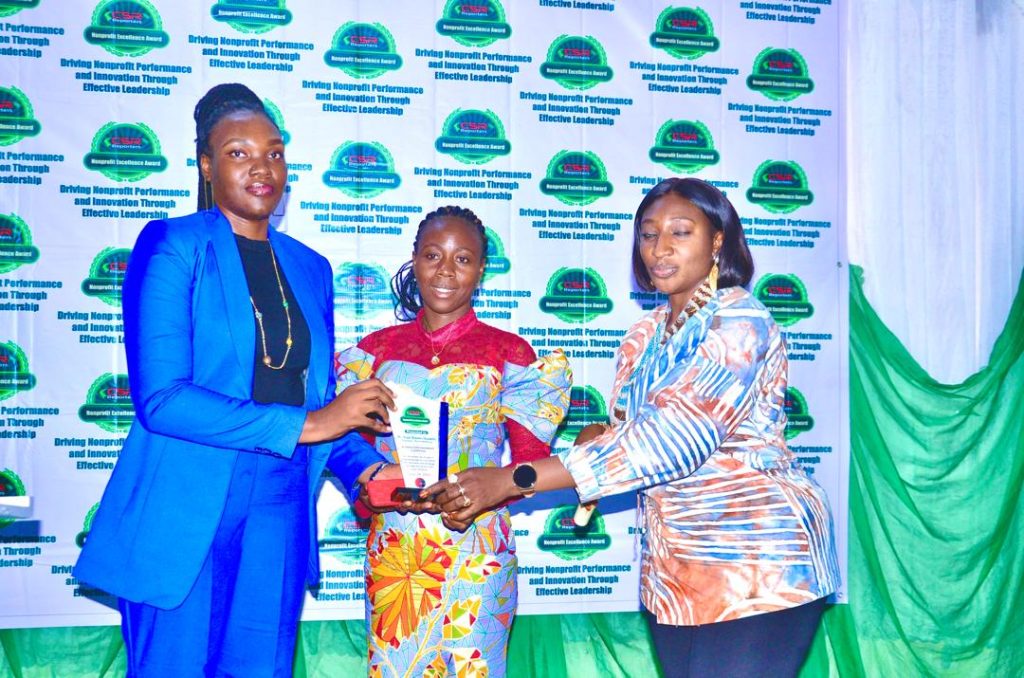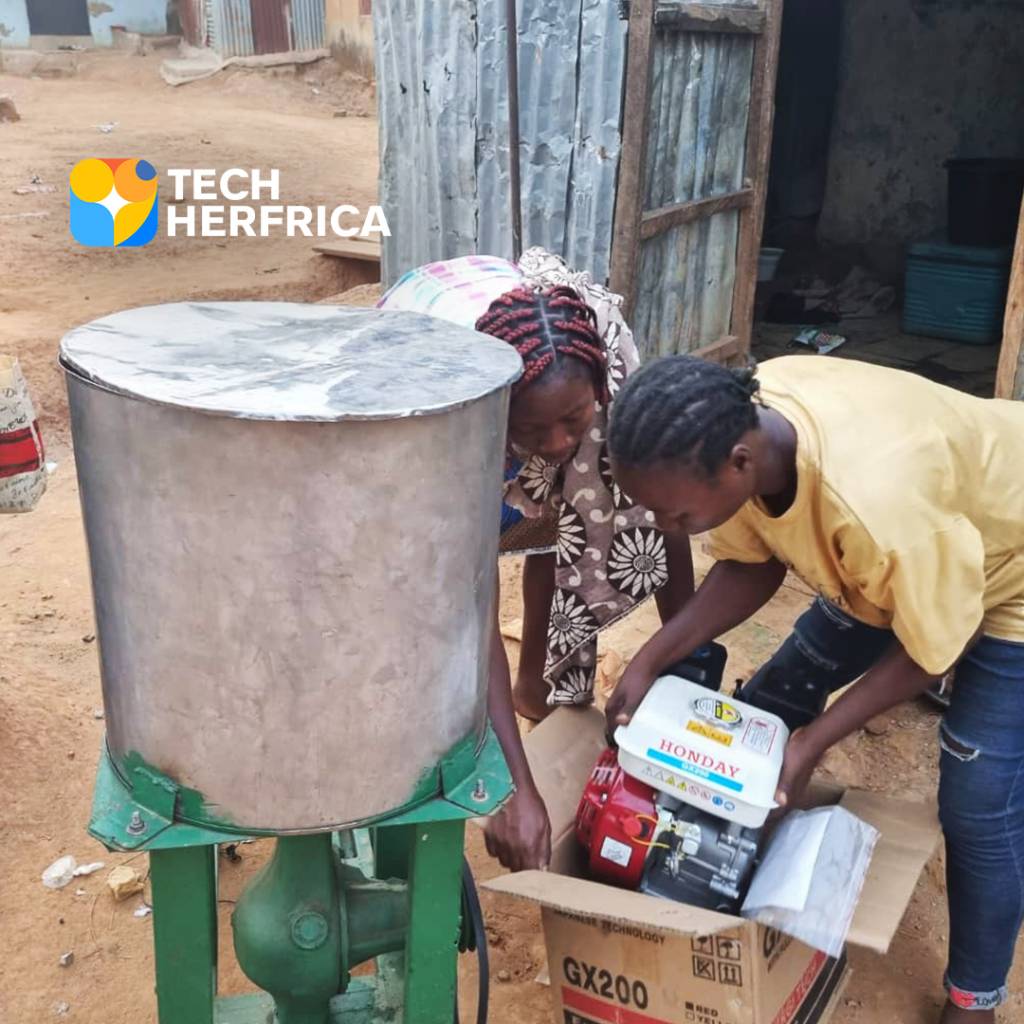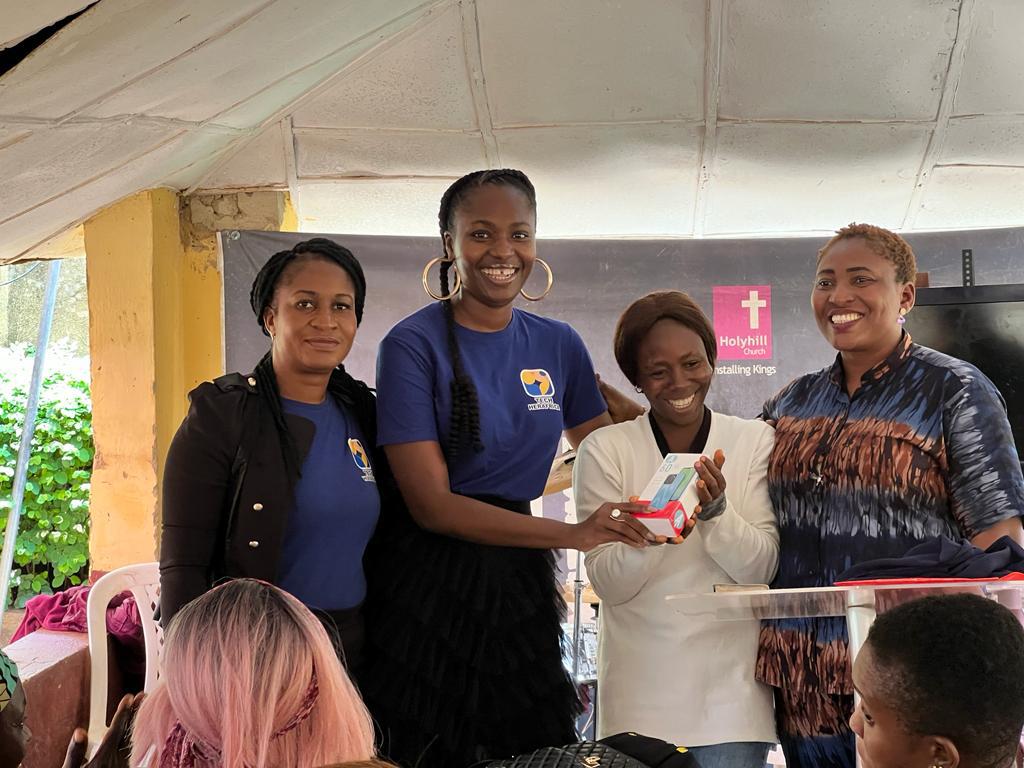Mary's Story
From Widow in Need to Helping Other Widows: How Digital Literacy and Technology Can Empower Women and Transform Lives

Just one year ago, Mary was a widow in need. She was just 33 when her husband died, leaving her to raise four children alone. In a Nigeria that today sees poverty-rates rising nationwide – especially in rural areas – Mary had little education, few marketable skills and limited job opportunities. She and her children struggled to survive, mostly relying on handouts and charity. They were often hungry, eating just once a day. And since she couldn’t afford to pay their school fees, the children languished at home.
“While other children were in school, mine weren’t, which made me very sad,” says Mary. “We usually wore old, tattered clothes. It was so bad that some people made fun of us. But I made up my mind to start a small business, to feed and clothe my children, then send them to school.”
She felt her only option was to process cassava – the local, potato-like starch – into what Nigerians call Akpu, which is typically eaten in various soups. However, she could only use the traditional manual methods of mortar and pestle, which not only produced small quantities, but caused her constant body aches. Sometimes, she felt too sick to even look after her children. They were trapped in a hand-to-mouth existence.
However, everything began to change for her in March 2023, when a friend invited her to a Tech Herfrica event in her community. Initially, she was skeptical that it could positively impact her.
“A lot of organizations have come to our community and said they would help us, but they never came back,” says Mary. “However, though I was scared to attend to avoid disappointment, something within me told me I should try it.”
She joined 150 other women in similarly dire circumstances, for an event that explained the need for digital and financial literacy – to access markets for her akpu and other items the women produce. Few had access to technology to improve production and reach new customers.
In fact, Mary is one of more than 100,000 women whom Tech Herfrica has identified across 18 communities in Nigeria. The Abuja-based NGO advocates for the transformational potential of practical-skills training for rural women who’d benefit the most. To that end, TH has so far trained more than 4,000 women on how to use smartphones and access other technology to grow their businesses and boost their income.
At the same time, the Tech Herfrica staff sensed Mary’s great potential: to not only succeed as a businesswoman, but to serve as a model and inspiration for others. She was able to clearly communicate her problems – and what exactly she needed to move her business forward.

“More importantly, she spoke with so much courage and conviction,” says Imade Bibowei-Osuobeni, the Founder and President of Tech Herfrica. “Her story embodied resilience in the face of challenges, which is a crucial trait we look for when selecting the women we work with.”
By the end of this introductory event, Mary was chosen for inclusion in the EquipHer4Growth program, which provides access to training, smartphones, and even locally produced machines to grow businesses. In the first phase of the program – the Digital and Financial Literacy training – Mary acquired practical skills to use a smartphone; learn how to search Google; access financial services using mobile-banking applications; and connect with customers outside her community, by using WhatsApp business, Facebook groups and e-commerce solutions.
She also learned the importance of savings, how to calculate profit, and keep simple business records. This made her more confident in her overall ability to manage a small business.
“Before the training, I was very afraid to do business online because of stories I’d heard about fraud,” says Mary. “Even if I had big dreams to become a serious Akpu producer, I felt the dream was too big because I lacked support and knowledge on how to do business properly.”
Furthermore, to enhance Mary’s cassava-processing efficiency and alleviate the physical toll that manual labor had on her health, Tech Herfrica purchased for her a locally built machine valued at $150. Putting the machine to immediate use, Mary not only multiplied her production of Akpu tenfold, but she no longer had to deal with the frequent aches and pains she experienced when hand-producing it.

As her production scaled up, a new obstacle emerged: the need to attract more customers. Consequently, in the program’s second phase, Tech Herfrica provided Mary with a smartphone.

Immediately, she put her newfound knowledge to action, utilizing WhatsApp for her business. Mary strategically shared images of her freshly made Akpu on her WhatsApp status, prompting interested contacts to place large orders, which she promptly filled. This proactive approach soon generated word-of-mouth referrals, allowing her to expand her customer base within and outside her community. WhatsApp facilitated seamless communication throughout this process.
Remarkably, just 12 weeks after her first Tech Herfrica training, Mary became known as a leading distributor of Akpu in her community. With so many new orders, she hired three other women to join her business. More importantly, her income grew to more than US$20 per day – an impressive figure by local standards. With a new savings account growing by the week, Mary was now not only able to feed her children more than once a day, but to enroll them in a private local school, which she suddenly found affordable.
“Mary is still on her journey to wealth creation,” says Bibowei-Osuobeni, the Tech Herfrica founder. “Her story illustrates that, with proper support, women in rural African communities can overcome poverty, build wealth, and improve their livelihoods. Yet without the required support, these women may remain in a perpetual cycle of poverty, unable to make informed decisions and support the economic growth of themselves, their children, and their families.”
Today, Mary is more than a shining example of how such training can transform a life; but even its trickle-down potential: remarkably, she now supports four other widows in her community, helping them build their own businesses.
Still, her children remain her priority – and Mary marvels at how much brighter their future looks.
“I never imagined that a day would come when I could boast that my children are able to attend a university that I myself was unable to,” says Mary. “I never even believed that I could wear such beautiful clothes. People who used to mock me now want to be friends with me. This is why I call Tech Herfrica the strength of a woman.”

